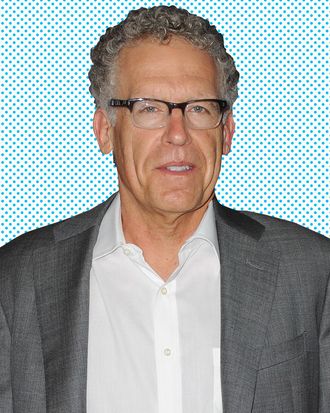
Carlton Cuse has become the King of Creepy TV. The Returned — his remake of the French undead drama Les Revenants — premieres on A&E tonight, following the season opener of his Psycho prequel Bates Motel. He’s also hard at work on season two of FX’s vampire-virus gorefest The Strain and USA’s upcoming conspiracy chiller Colony. It’s no mystery why he’s compelled to produce these types of shows. “After Lost, it would be hard for me to do a straight-up drama like Parenthood, which doesn’t have the added genre elements that give storytelling octane,” he tells Vulture. In other words, don’t expect him to reboot Nash Bridges anytime soon.
Why did you decide to do an English-language version of The Returned?
I love the idea that it had this genre-show hook but it was really character-focused. The French show was great, but it afforded a lot of opportunity downstream for originality. There were only eight episodes of the French show. We take a fairly significant left turn about six episodes in, and at that point, our show really becomes its own thing. To me, the model was The Office. The American version started in a similar place to the British version but became a very different show.
What kinds of things did you have to change to make it more American?
One of the things I liked about the French show was it was decidedly unsentimental. The characters were very cool in the face of this traumatic event in which people inexplicably come back from the dead. So when the 18-year-old daughter in the French show came back, nobody hugged her. But it just seemed inconceivable that neither parent would hug their daughter in the American version.
What sets The Returned apart from other shows about the undead?
We avoid the obvious clichéd road that the premise might suggest — we’re not calling in the National Guard or doing autopsies. It isn’t a mystery about why these people came back. It’s really a show about what happens if someone you dearly loved were to return. How would that person fit back into your life? And for the characters who died, they just want to reintegrate, but time marches on and it’s impossible to pick up where they left off.
Do you worry about viewers confusing this show with ABC’s Resurrection?
I intentionally didn’t watch Resurrection, because I didn’t want it to influence our storytelling. My hope is that a good story will win out. There are a million ghost stories, and they work or don’t work based on how they’re executed.
The Returned and Damon Lindelof’s The Leftovers are flip sides of Lost, in that they’re about people left behind after losing loved ones. Is that a coincidence?
It’s a bit ironic that both Damon and I have found ourselves dealing with shows about the consequences of departing this world. But it’s a great example of how some of the same topics are being explored from radically different perspectives. We’re each going to find our own way to tell stories in this space.
Your FX drama The Strain started with a plane disaster, as Lost did, and The Returned starts with a bus crash. Is there something spooky going on here?
All I can say is that Fabrice Gobert, the creator of the French version, told me he was influenced by Lost, so maybe that explains the bus crash. But Guillermo del Toro and Chuck Hogan conceived of The Strain before Lost came on the air, so the dueling plane incidents are purely coincidental.
Bates Motel is starting its third season, and you and co-creator Kerry Ehrin have said you have a five-year plan for the show. So are we nearing the halfway point in the devolution of Norma and Norman Bates’s relationship?
Yes, it’s kind of wonderful to know when your story is going to end. We have a very clear path ahead. Everything we’ve been doing is starting to coalesce this year.
Are you ever tempted to depart from the mythology and give the show a slightly happier ending than the one we saw in Psycho?
Our ending will feel original, but what gives the show its tension is we’re telling a tragedy. Titanic was a tragedy. You know the ship’s inevitable fate, but your worry about what’s going to happen to Leo and Kate drives your interest in that story.
How do you handle the incestuous vibe between Norman and Norma?
It’s an ongoing dialogue between the writers and the actors. Vera Farmiga and Freddie Highmore are very close friends, and we all have a sense of what’s right at any given moment. None of us want to be salacious about how the relationship progresses. But the repressed sexual connection between them is very much a part of their pathology. We work hard to find interesting ways to articulate that.
How are you juggling these three shows as well as USA’s Colony coming up? Have you created a clone of yourself?
I have great collaborators. That’s the key. When I first started running shows, I felt like I had to do everything myself. Over time I’ve come to realize that an effective collaboration leads to better work than I’d be capable of doing by myself.

